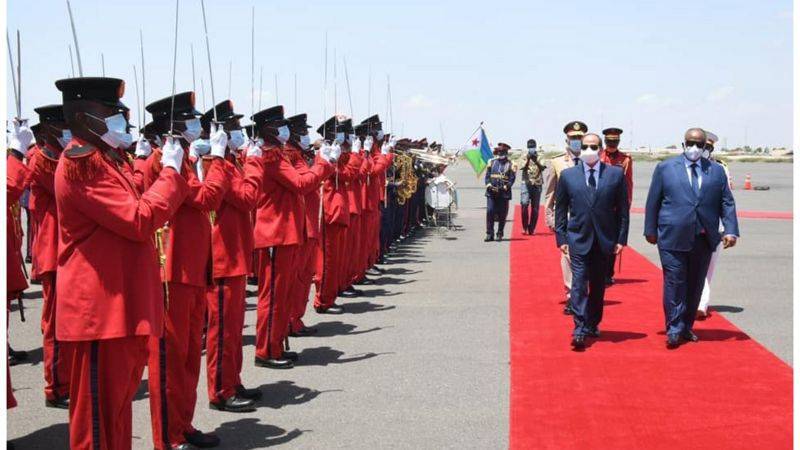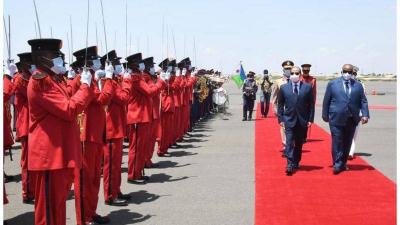Abdel Fattah el-Sisi has become the first Egyptian president to visit Djibouti in history. In a video clip published by the Egyptian presidency, Djibouti’s President Ismail Omar Guelleh and his Egyptian counterpart appeared to be engaged in conversation while exchanging smiles, as if they had known each other for a long time. Cairo stated that the visit aimed to strengthen bilateral relations in the economic, security, and military fields. Prior to el-Sisi's visit, Egypt sent a shipment of food and medical aid to Djibouti. Djibouti is the fifth country bordering Ethiopia—with Sudan, Uganda, Burundi, and Kenya being the others—with which Egypt has enhanced military cooperation over the past three months. This coincides with the approach of the second filling of the Grand Ethiopian Renaissance Dam (GERD), which Ethiopia has confirmed will take place this season, amid escalating rhetoric between Ethiopia and the downstream Nile nations, Egypt and Sudan.
**Joint Military Exercises Named “Nile Protectors”**
In March, Egypt signed a military agreement with Sudan during a visit by Egyptian Chief of Staff, Lieutenant General Mohamed Farid, to Sudan. Following the agreement, Farid affirmed that Egypt seeks to “solidify ties and relationships with Sudan in all areas, especially military and security, and solidarity as a strategic approach imposed by the regional and international environment.” Recently, Egypt and Sudan conducted three joint military exercises named “Nile Eagles 1” and “Nile Eagles 2,” with the latest, “Nile Protectors,” continuing until the end of May. These drills involve land, air, and naval forces from both countries. Egypt states that the training aims to enhance joint operational capabilities between the armed forces of Egypt and Sudan.
Egyptian military expert, Brigadier General Safwat El-Zayat, noted that the difference between the “Nile Protectors” exercises and the previous “Nile Eagles” series is that the forces have moved geographically closer to the Sudanese-Ethiopian border. El-Zayat explained to BBC Arabic that this proximity will aid in gaining experience and training in the combat environment relevant to potential military engagements with Ethiopia, should Egypt decide on such action. He added that bringing the forces closer to their objectives means that air sorties will have a shorter range, allowing them to carry more munitions rather than merely focusing on long-range sorties which consume capacity for fuel.
**Intelligence Cooperation**
Egypt also signed a military intelligence agreement with Uganda in early April. Lieutenant General Samah Saber El-Degwi, head of the Egyptian delegation and deputy head of the Egyptian Intelligence Agency, stated in a press release shared by the Ugandan government and reposted by the Egyptian embassy in Kampala that “the fact that Uganda and Egypt share the Nile makes cooperation between the two countries imperative, as what affects Ugandans will also affect Egypt in one way or another.” Just days later, Egypt signed another military cooperation agreement with Burundi. Last Wednesday, the Chief of Staff of the Egyptian Army was in Kenya to sign a mutually beneficial military agreement, as announced by the Kenyan Ministry of Defense.
El-Zayat distinguishes between Egypt's military cooperation with Sudan and its dealings with the other four countries, explaining that these nations—excluding Kenya, which has political problems with Ethiopia—maintain a neutral position in the dispute between Egypt and Ethiopia over the GERD. Some of them have signed the Entebbe Agreement, which calls for a redistribution of Nile water shares. El-Zayat added that Sudan has similar political and military stances with Egypt, while Egypt can benefit from the other countries in gathering intelligence about the GERD or any future dams Ethiopia may build on the Nile's sources. He notes that these countries, along with others in the same region, already have military cooperation with Egypt.
**Ethiopia's Readiness**
It was notable that Ethiopia commented on the Egyptian-Sudanese joint military exercises “Nile Protectors.” The statement came from the Ethiopian Foreign Ministry spokesman, Dina Mufti, who stated that “the two countries have the right to engage in whatever military exercises they see fit.” However, Mufti added, “Ethiopia has strong armed forces capable of safeguarding national security and deterring any external aggression.” Social media in Egypt, Sudan, and Ethiopia has been abuzz with comments about the potential for military confrontation between Egypt and Sudan on one side and Ethiopia on the other, as well as discussions about the military capabilities of the three countries.
Ethiopian political analyst Abdul Shakur Abdul Samad argues that comparisons of military capabilities will not be resolved by numbers and weaponry alone. He clarifies to BBC that while Egypt may have larger forces and more weapons, there are other favorable factors for Ethiopia such as geography and the nature of the terrain. He dismisses the notion that the rapprochement between Egypt and its neighboring countries is aimed at military cooperation against Ethiopia, arguing that the agreements signed with these countries are “public relations agreements that do not carry a higher level of commitment.” However, he acknowledges that Egypt has not had such levels of closeness and relations with many countries in the Horn of Africa in past decades.
Abdul Samad criticizes calls from certain Egyptian elites for military action concerning the issue of the GERD, emphasizing that the costs of such actions would be high for all involved and that Egypt needs funds for domestic economic and social spending. He sees the military agreements as primarily sending a message from Egypt to the Ethiopian public, conveying that “we might take military action at any stage regarding the Nile waters.”
The countries involved in the GERD crisis—Egypt, Sudan, and Ethiopia—have failed to reach an agreement on the dam's filling and operation over ten years of negotiations. However, in recent months, the rhetoric from Egypt and Sudan has intensified regarding “Ethiopian intransigence.” As the United States returns to take the lead in another effort to reach an agreement before the second filling of the dam, Egypt is ramping up its international outreach to revive the issue before the global community, while the coming days will be crucial in determining whether military action or other methods will be employed regarding the dam. El-Sisi previously described such military action as one that, if undertaken, “would cause an unimaginable degree of instability in the region.”




